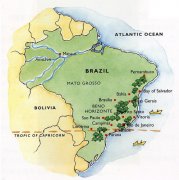Ivory Coast is gradually moving towards boutique coffee coffee beans.
Specialty coffee is also known as specialty coffee or specialty coffee. It refers to coffee made from green beans with excellent taste characteristics grown in a few extremely ideal geographical environments. Depending on the particular soil and climatic conditions in which they are grown, they have outstanding flavors. This type of coffee is carefully selected and graded for its hard texture, rich taste and excellent flavor before it is considered a selected coffee bean.
In terms of volume, it is one of the largest producers in the world.
Cote d'Ivoire (Cte d'lvoire) never produces the best quality coffee, and very little coffee comes from the arabica tree. In the early 1980s, it was the third largest coffee producer in the world, producing 5 million bags a year. Even today it is the fifth largest coffee producer in the world, producing 4.4 million bags a year. Cote d'Ivoire is second only to Indonesia (6.8 million bags per year) in terms of production of Roscoff coffee.
In the 1980s, Cote d'Ivoire produced only 250 kilograms of coffee per hectare. This is partly due to poverty, but also to the ageing of coffee trees. Lack of investment and absence of a long-term business plan also affected coffee production.
The Government of Cote d'Ivoire has begun to take positive measures to reverse this situation. The National Coffee Board has been reconstituted and streamlined, and some production activities have been transferred to private companies. The Government provides minimum price guarantees to farmers who produce high-quality coffee and encourages exporters to buy directly from farmers. Eighty per cent of coffee exports now find a market in the European Community countries, with France and Italy being the main buyers.
It is worth noting that Cote d'Ivoire is a major centre for coffee smuggling, with up to 2600 tons smuggled in 1993 - 1994, mainly via neighbouring Mali and Guinea.

Important Notice :
前街咖啡 FrontStreet Coffee has moved to new addredd:
FrontStreet Coffee Address: 315,Donghua East Road,GuangZhou
Tel:020 38364473
- Prev

Ivory Coast is gradually moving towards boutique coffee coffee beans.
Boutique coffee (specialty coffee) is also called specialty coffee selection coffee. It refers to coffee made from a small number of raw beans with excellent taste grown in an ideal geographical environment. Depending on the special soil and climatic conditions in which they grow, they have outstanding flavor. After strict selection and classification, this kind of coffee is hard in texture, rich in taste and stylish.
- Next

Most Kenyan coffee grows at 1500-2100 meters above sea level. Kenyan boutique coffee.
Boutique coffee (specialty coffee) is also called specialty coffee selection coffee. It refers to coffee made from a small number of raw beans with excellent taste grown in an ideal geographical environment. Depending on the special soil and climatic conditions in which they grow, they have outstanding flavor. After strict selection and classification, this kind of coffee is hard in texture, rich in taste and stylish.
Related
- Does Rose Summer choose Blue, Green or Red? Detailed explanation of Rose Summer Coffee plots and Classification in Panamanian Jade Manor
- What is the difference between the origin, producing area, processing plant, cooperative and manor of coffee beans?
- How fine does the espresso powder fit? how to grind the espresso?
- Sca coffee roasting degree color card coffee roasting degree 8 roasting color values what do you mean?
- The practice of lattes: how to make lattes at home
- Introduction to Indonesian Fine Coffee beans-- Java Coffee producing area of Indonesian Arabica Coffee
- How much will the flavor of light and medium roasted rose summer be expressed? What baking level is rose summer suitable for?
- Introduction to the characteristics of washing, sun-drying or wet-planing coffee commonly used in Mantenin, Indonesia
- Price characteristics of Arabica Coffee Bean Starbucks introduction to Manning Coffee Bean Taste producing area Variety Manor
- What is the authentic Yega flavor? What are the flavor characteristics of the really excellent Yejasuffi coffee beans?

